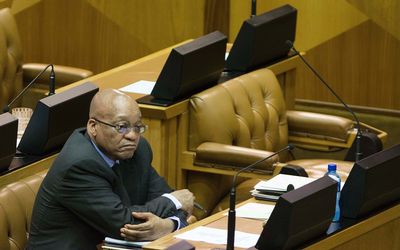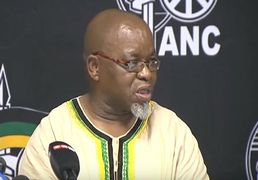Budget thumbs-up from ANC allies also thumbs-down sign to Zuma
by Sam Mkokeli,
2016-02-26 07:01:44.0
AFRICAN National Congress (ANC)-aligned unions and the South African Communist Party (SACP) have given their thumbs-up to what they called a "balanced budget speech" delivered by Finance Minister Pravin Gordhan on Wednesday.
This is the closest to a blank cheque a finance minister will get from the ANC’s allies, who have historically been critical of the Treasury, which they have accused of advancing business-friendly, "neoliberal" policies since 1996.
This seems an ideological contradiction for the Left, especially in light of provisions such as the intimated partial privatisation of South African Airways and other state-owned enterprises. However, this stance is symptomatic of the broader battle for control of the alliance.
The circumstances surrounding Mr Gordhan’s return to the Treasury in December were a wake-up call to the Left, once vociferous supporters of President Jacob Zuma who were instrumental in his rise to power.
Mr Gordhan was reappointed after a December 9 move to install the little-known Desmond van Rooyen as finance minister.
That move, since dubbed 9/12 — borrowed from the US’s 9/11 — blew up in Mr Zuma’s face and injected energy into factions opposed to him. In the process, Mr Gordhan’s political capital has accrued to the point where he is seen as more credible than the president.
"Nenegate" — named after former finance minister Nhlanhla Nene, who was summarily dismissed in December for no apparent credible reason and has since resigned as an MP — was partly seen as a strategy to gain control of the Treasury.
This happened in a climate of rising fear that predatory networks were attempting to effect total capture of the state they have been bleeding dry at all levels.
This jolted the Left from its slumber and drove it to revive its dormant campaigns against corruption.
Coincidentally, the budget came days after a special meeting between the Congress of South African Trade Unions (Cosatu) and the SACP, which called for the closing of ranks between the two to fight state capture more effectively.
Following a meeting of its central executive committee yesterday, Cosatu said in a statement: "Our two formations committed to fearlessly exposing those associated with state capture, through parasitism within our movement structures."
The federation also welcomed the budget in a conciliatory tone.
"Overall, the budget is reflective of the state of our economy and we feel that the minister did a commendable balancing act. (He) resisted the calls for extreme voluntary austerity measures by the neoliberal proponents, who were saying that he must hand over everything to them and punish the weak and the poor for our economic stagnation."
It also had a moderate reaction to measures to contain the public sector wage bill through a hiring freeze and other initiatives.
But it warned that "such decisions must be arrived at through engaging unions at the public sector collective bargaining council and not simply through managerial dictates".
A member of the SACP political bureau, speaking on condition of anonymity, says it is necessary for the Treasury and the Left to close ranks. "We can’t allow neoliberals to capture the anticorruption, good governance space and use it for their own purposes."
It now appears they are embracing Mr Gordhan and the Treasury to portray themselves as opposed to Mr Zuma, whom they had no qualms helping ascend to power.

President Jacob Zuma listens to the state of the nation debate in Parliament on Tuesday. Picture: TREVOR SAMSON
AFRICAN National Congress (ANC)-aligned unions and the South African Communist Party (SACP) have given their thumbs-up to what they called a "balanced budget speech" delivered by Finance Minister Pravin Gordhan on Wednesday.
This is the closest to a blank cheque a finance minister will get from the ANC’s allies, who have historically been critical of the Treasury, which they have accused of advancing business-friendly, "neoliberal" policies since 1996.
This seems an ideological contradiction for the Left, especially in light of provisions such as the intimated partial privatisation of South African Airways and other state-owned enterprises. However, this stance is symptomatic of the broader battle for control of the alliance.
The circumstances surrounding Mr Gordhan’s return to the Treasury in December were a wake-up call to the Left, once vociferous supporters of President Jacob Zuma who were instrumental in his rise to power.
Mr Gordhan was reappointed after a December 9 move to install the little-known Desmond van Rooyen as finance minister.
That move, since dubbed 9/12 — borrowed from the US’s 9/11 — blew up in Mr Zuma’s face and injected energy into factions opposed to him. In the process, Mr Gordhan’s political capital has accrued to the point where he is seen as more credible than the president.
"Nenegate" — named after former finance minister Nhlanhla Nene, who was summarily dismissed in December for no apparent credible reason and has since resigned as an MP — was partly seen as a strategy to gain control of the Treasury.
This happened in a climate of rising fear that predatory networks were attempting to effect total capture of the state they have been bleeding dry at all levels.
This jolted the Left from its slumber and drove it to revive its dormant campaigns against corruption.
Coincidentally, the budget came days after a special meeting between the Congress of South African Trade Unions (Cosatu) and the SACP, which called for the closing of ranks between the two to fight state capture more effectively.
Following a meeting of its central executive committee yesterday, Cosatu said in a statement: "Our two formations committed to fearlessly exposing those associated with state capture, through parasitism within our movement structures."
The federation also welcomed the budget in a conciliatory tone.
"Overall, the budget is reflective of the state of our economy and we feel that the minister did a commendable balancing act. (He) resisted the calls for extreme voluntary austerity measures by the neoliberal proponents, who were saying that he must hand over everything to them and punish the weak and the poor for our economic stagnation."
It also had a moderate reaction to measures to contain the public sector wage bill through a hiring freeze and other initiatives.
But it warned that "such decisions must be arrived at through engaging unions at the public sector collective bargaining council and not simply through managerial dictates".
A member of the SACP political bureau, speaking on condition of anonymity, says it is necessary for the Treasury and the Left to close ranks. "We can’t allow neoliberals to capture the anticorruption, good governance space and use it for their own purposes."
It now appears they are embracing Mr Gordhan and the Treasury to portray themselves as opposed to Mr Zuma, whom they had no qualms helping ascend to power.



























Change: -0.47%
Change: -0.57%
Change: -1.76%
Change: -0.34%
Change: 0.02%
Data supplied by Profile Data
Change: -1.49%
Change: 0.08%
Change: -0.47%
Change: 0.00%
Change: -0.04%
Data supplied by Profile Data
Change: -0.34%
Change: 0.03%
Change: -0.10%
Change: -0.22%
Change: -0.81%
Data supplied by Profile Data
Change: -0.28%
Change: -1.15%
Change: -0.07%
Change: -1.21%
Change: -0.22%
Data supplied by Profile Data